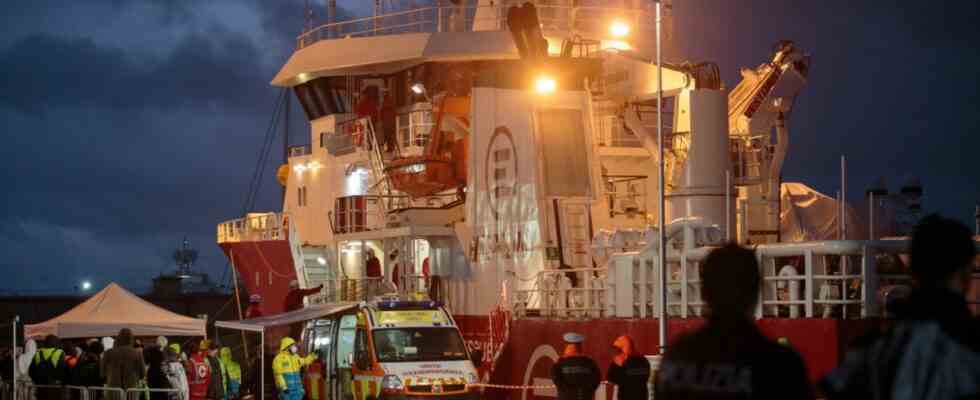High fines, confiscation of ships: the right-wing Meloni government in Rome has issued a decree that makes it very difficult for aid organizations to operate in the Mediterranean. The NGOs are outraged.
The Italian government has passed a decree that is intended to significantly limit the deployment of civil sea rescuers in the Mediterranean. International aid workers reacted with outrage to the initiative of Prime Minister Giorgia Meloni’s right-wing government. Among other things, the decree stipulates that the ships of the aid organizations must immediately head for an assigned port after an initial rescue, without being able to provide assistance to other boats in distress. Normally the ships perform several rescues of people on small boats per mission. In addition, migrants and refugees should say on the ship whether and, above all, in which EU country they want to apply for asylum and then fill out the applications.
If the new regulations are violated, Rome is threatening the captains of civilian ships with high fines of up to 50,000 euros. In addition, the ships could be confiscated by the authorities and detained in Italian ports. Meloni said at a year-end press conference on Thursday that her government had put migration back on the international agenda. She also claimed that the decree would reconcile NGO operations with international law.
Aid organizations are fighting against the decree: illegal
“The new decree of the Italian government is a call to drown,” said Oliver Kulikowski from the German association Sea-Watch, which regularly goes to the central Mediterranean. “Forcing ships into port violates the duty to rescue if there are other people in distress. We will also oppose this attempt to criminalize civil sea rescue and to deprive refugees of their rights.”
According to the Regensburg NGO Sea-Eye, the decree is illegal – “insofar as it regulates the behavior of German-flagged ships in international waters and sanctions entry into the Italian territorial sea,” said Valentin Schatz from Sea-Eye. The state has no regulatory and enforcement powers regarding sea rescue of foreign ships beyond its territorial sea (12 nautical miles). “Italy cannot therefore dictate how rescue operations are to be carried out in international waters.” Doctors Without Borders also criticized. “We will be forced to leave the rescue zone in the Mediterranean unprotected, which will result in the death toll increasing,” Marco Bertotto, the NGO’s Italy officer, told the newspaper La Stampa.
The use of civilian ships has long been a thorn in the side of the right in Rome. In November, an attempt was made to ban two ships from bringing the rescued people ashore. Most recently, the authorities only assigned ships to very distant ports in order to harass them, according to the helpers. the OceanViking from SOS Méditerranée, for example, currently has to travel around 900 nautical miles from southern Italy to Ravenna on the northern Adriatic with 113 rescued people. The Italian government justifies its action against the organizations with the claim that they would encourage illegal migration and help smugglers in the Mediterranean. The NGOs reject this.

